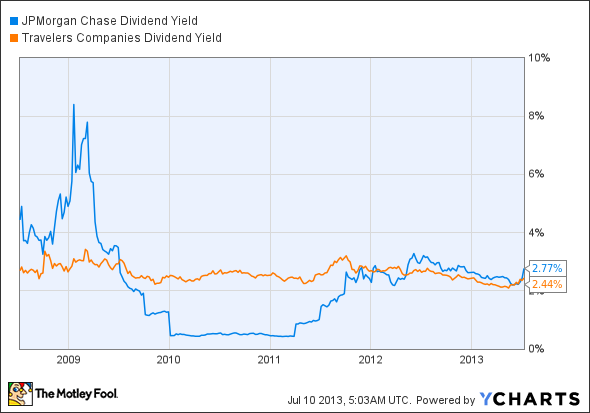Dividend stocks outperform non-dividend-paying stocks over the long run. It happens in good markets and bad, and the benefit of dividends can be quite striking: Dividend payments have made up about 40% of the market's average annual return from 1936 to the present day. But few of us can invest in every single dividend-paying stock on the market, and even if we could, we might find better gains by being selective. That's why we'll be pitting two of the Dow Jones Industrial Average's (^DJI -0.52%) dividend payers against each other today to find out which Dow stock is the true dividend champion. Let's take a closer look at our two contenders now.
Tale of the tape
JPMorgan Chase (JPM 0.42%) is a 10-year veteran of the Dow, but its history stretches back for more than a century. The J.P. Morgan name has long been connected to dominant banking empires, and today's megabank is no different: JPMorgan, headquartered right on Wall Street in New York, is now the largest bank by assets in the world. However, this venerable institution may not be able to win today, as the bank (along with its dividend) was brought low by the financial crisis in 2009.
Travelers (TRV -2.95%) has only been on the Dow in its present form since 2009, but it first joined in 1997, only to be replaced by the megabank that acquired it at the turn of the century. Now that it's independent again, the New York City-based insurer has reclaimed a history that stretches further back than JPMorgan's to a $0.02 transaction in Hartford, Conn. Travelers has held up well through the devastation of the financial crisis, but will its pedigree be enough to fend off JPMorgan?
|
Statistic |
JPMorgan |
Travelers |
|---|---|---|
|
Market cap |
$210.2 billion |
$31.3 billion |
|
P/E ratio |
9.9 |
12.7 |
|
Trailing 12-month profit margin |
22.3% |
10% |
|
Five-year total return |
85.1% |
116.5% |
Source: Morningstar and YCharts.
JPMorgan has the size and the margins, but it looks like the market prefers Travelers today. Will the insurer triumph over the House of Morgan? Let's find out.
Round one: endurance
According to Dividata, JPMorgan (and its ancestor companies) began paying dividends in 1984, making for a 29-year streak. That beats Travelers, which has 25 years of recorded dividend payments.
Winner: JPMorgan, 1-0
Round two: stability
Paying dividends is well and good, but how long have our two companies been increasing their dividends? The same dividend payout year after year can quickly fall behind a rising market, and there's no better sign of a company's financial stability than a rising payout in a weak market (so long as it's sustainable, of course). JPMorgan drastically cut its dividend in 2009 and didn't raise it again until 2011, which falls short of Travelers' nine-year streak of increases.
Winner: Travelers, 1-1
Round three: power
It's not that hard to commit to paying back shareholders, but are these payments enticing or merely token? Let's take a look at how both companies have maintained their dividend yields over time as their businesses and share prices have grown:
JPM Dividend Yield data by YCharts.
Winner: Travelers, 2-1
Round four: strength
A stock's yield can stay high without much effort if its share price doesn't budge, so let's take a look at the growth in payouts over the past five years. If you bought in several years ago and the company has grown its payout substantially, then your real yield is likely much better than what's shown above.
JPM Dividend data by YCharts.
Winner: Travelers, 3-1
Round five: flexibility
A company needs to manage its cash wisely to ensure that there's enough available for tough times. Paying out too much of free cash flow in dividends could be a warning sign that the dividend is at risk, particularly if business weakens. This next metric analyzes just how much of their free cash flows our two companies have paid out in dividends over the past four quarters:
JPM Cash Div. Payout Ratio TTM data by YCharts.
Winner: JPMorgan, 2-3
JPMorgan puts forth a valiant effort, but it's not enough to overcome Travelers' greater consistency through the financial crisis. Would you rather have your dividends insured by a name like Travelers, or are you going to bank on greater growth in JPMorgan's payouts in the future?








